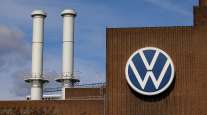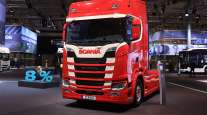Volkswagen Appeals Rejected as High Court Allows Emissions Scandal Suits

[Stay on top of transportation news: Get TTNews in your inbox.]
The U.S. Supreme Court rejected two appeals from Volkswagen AG, leaving intact rulings that let state and local governments sue over a diesel-emissions cheating scandal that already has cost the German automaker more than $23 billion.
The justices without comment on Nov. 15 refused to hear arguments by Volkswagen and several company units that the U.S. Clean Air Act provides a broad shield for automakers from state and local liability over updates to vehicle emissions systems.
The rebuffs let the state of Ohio and counties in Florida and Utah press ahead with suits using laws that bar tampering with emissions systems. Lower courts said the Clean Air Act allows those suits to the extent they target software updates on cars already on the road.
“This is not a determination of the merits of Volkswagen’s arguments and is based on one-sided records taken from the plaintiffs’ complaints,” Volkswagen said in an email statement. “We are confident in the strength of our factual and legal defenses, including that the software updates reduced emissions, and will contest these claims vigorously as these cases proceed.”
Volkswagen argued unsuccessfully that Congress gave the U.S. Environmental Protection Agency exclusive power to regulate automakers’ compliance with emissions rules. “[The rulings threaten to] throw one of America’s largest industries into regulatory chaos, to the detriment of manufacturers, dealers, consumers and the environment,” Volkswagen said in court papers.

Volkswagen AG CEO, Herbert Diess
The rejection follows the recommendation of the Biden administration, whose advice the justices sought in the county cases.
Volkswagen pleaded guilty in 2017 to federal charges of misleading regulators and customers about its emission systems and obstructing investigations after officials grew suspicious.
The Clean Air Act explicitly bars state and local regulation of emission systems before cars are sold. But both the Ohio Supreme Court and the San Francisco-based 9th U.S. Circuit Court of Appeals said anti-tampering laws could be enforced with regard to already-sold cars.
“We are mindful that our conclusion may result in staggering liability for Volkswagen,” the 9th Circuit said in the county case. “But this result is due to conduct that could not have been anticipated by Congress: Volkswagen’s intentional tampering with post-sale vehicles to increase air pollution.”
In September, Volkswagen agreed to pay $1.5 million to settle claims by Montana and New Hampshire over post-sale software updates. The relatively small size of those accords suggest the state and local suits could cost Volkswagen considerably less than the 9th Circuit envisioned.
Volkswagen admitted to installing so-called defeat devices that reduced nitrogen oxide emissions when hundreds of thousands of vehicles were being tested. The devices let the vehicles pass emission tests even though they didn’t meet federal standards while on the road.

For Veterans Day, host and Navy veteran Michael Freeze sits down with Army veterans James Rogers, owner of Spartan Direct Trucking Co. and 2020 Transport Topics Trucking's Frontline Hero, and John Baxter, equipment columnist. Hear a snippet above, and get the full program by going to RoadSigns.TTNews.com.
Starting around 2012, consumers began reporting problems that VW engineers concluded could be fixed by updating the software in the defeat devices. Volkswagen installed the fixes through a combination of voluntary recalls and regular maintenance visits, telling consumers the updates were intended to improve their car’s operation.
Florida’s Hillsborough County and Utah’s Salt Lake County urged the Supreme Court to reject the appeal in their case without a hearing. “The act expressly preserves state and local authority over post-sale cars,” the counties argued.
Ohio told the justices, “Nothing in the Clean Air Act’s text suggests that state laws regulating post-sale tampering with emission-control devices thwart the act’s objective of allowing the EPA alone to regulate new-car emissions.”
The Biden administration said that, while state and local suits might be barred if they involve modifications that the EPA had required or approved, the Volkswagen case involves no such conflicts.
Several business groups backed the Volkswagen appeals.
Justice Stephen Breyer didn’t take part in the cases at the Supreme Court. His brother, Charles Breyer, is a federal district judge who is handling the county lawsuits.
Want more news? Listen to today's daily briefing below or go here for more info:




